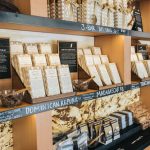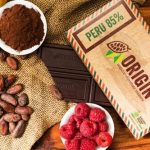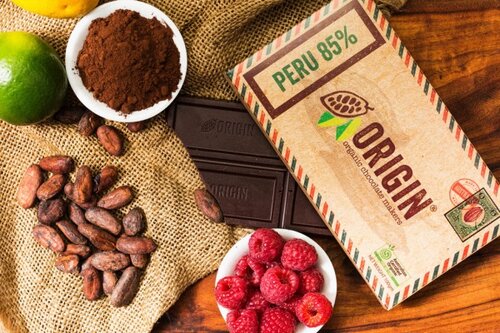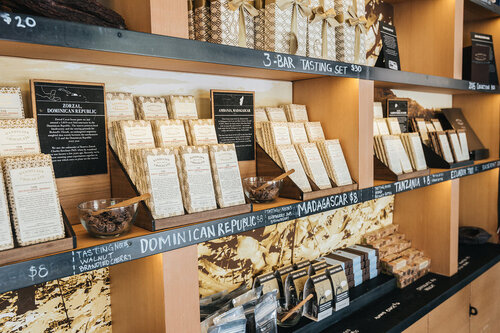
Five Actions to Take Now to Position Liberia to Attract Investment from Premium Cocoa Buyers
January 9, 2024
Opinion: Think Peru, Not Ghana – Lessons for Liberia’s Cocoa Industry By Mark Wallace
January 9, 2024LUSH Cosmetics offers a picture of what premium buyers can offer Liberia
Mark Wallace, Loris Shannon, Kim Beevers
Liberia can develop its cocoa industry to command a greater share of industry wealth globally.
We often hear about the challenges that inhibit Liberia’s cocoa industry growth: old farms, poor infrastructure, pricing inequities, inaccurate pricing calculations, a general absence of planned and coordinated growth efforts, and so on.
We also see an opportunity to differentiate and grow Liberia’s cocoa industry by focusing the country’s efforts on attracting investment from premium buyers willing to pay more – much more – than conventional buyers.
In November, sustainability-focused, hand-made global cosmetics brand LUSH visited Liberia to assess stakeholders in the cocoa sector and evaluate organizations for potential long-term partnership. LUSH values quality ingredients, ethical buying, forest friendly, and investment in sustainable supply chains. Although the company currently sources cocoa from several countries, they are looking to expand their supply from West Africa, particularly Liberia and Sierra Leone.
Working in the easiest markets is not a priority for the cosmetics brand; LUSH is an impact-driven company with a goal of investing in more challenging areas where they can help farmers maximize their potential. It is a mutually beneficial partnership, where LUSH gets organic and fair-trade cocoa, the rainforest is preserved, and farmers access new and better markets that grow income.
What does Liberia have to offer?
- Premium buyers like LUSH are environmentally conscious. Companies with a conservation focus are challenged to invest in neighboring Ivory Coast and Ghana as these countries have logged nearly all of their primary rainforest. One of the main reasons why Liberia caught the attention of the cosmetics brand is because its rainforest is still largely intact.
- Although Liberian cocoa is not yet certified organic, farmers have virtually no access to inorganic inputs (pesticides, herbicides, inorganic fertilizers) – enabling an easier transition to certified organic cocoa.
- Liberia does not have a cocoa board that handles all of its cocoa exports, as in Ivory Coast and Ghana. This allows for 100% traceability throughout the supply chain, something that LUSH rigorously demands. Premium buyers like LUSH are not solely concerned with the quality of cocoa that is being produced but want assurance that it is being sourced in a sustainable, environmentally friendly way that also considers social standards and ethical economic practices.
- Nearly all Liberian cocoa farmers belong to a farmer cooperative, simplifying the process of liaising with farmers. GROW has been working closely with cooperatives towards certification and sustainability, strengthening better business practices, best practices in agriculture, traceability and transparency from the farmer to the buyer, and storage and handling.
Attracting investment from premium cocoa buyers would yield high impact for the sector
Liberia has an opportunity to differentiate itself on the global market as a source of high-quality and sustainable cocoa for premium buyers whose customers are willing to pay high prices.
In order to attract these buyers, Liberian producers must demonstrate that they are adhering to sustainable practices.
In exchange for sustainable cocoa, companies like LUSH offer producers’ premium prices. This would mean higher incomes to farmers and farmer groups – benefiting the lives of everyone throughout the cocoa value chain.
In addition to offering higher prices for more sustainable goods, companies like LUSH also present intercropping opportunities. For example, crops such as vanilla, which is currently worth $600 per kg, can be grown on cocoa farms and in the rainforests without degrading the environment. Intercropping and diversification of crop portfolios means less risk for farmers if cocoa prices go down. Further, additional crops boost their income.
Currently, the Government of Liberia (GoL) and the Liberia Agriculture Commodity Regulatory Authority (LACRA) do not incorporate the needs of premium buyers and certified cocoa in their regulations. However, if the GoL’s revenue generation was structured around that opportunity, it could mean higher revenue for them as well.
LUSH Cosmetics’ interest demonstrates the tangible and values-driven opportunity to attract premium buyers to Liberia.
GROW is working to position the Liberian cocoa sector to attract investment from premium buyers. A coordinated industry effort – from government regulation to farmer production to donor engagement – would position Liberia as a premium cocoa destination. Investment from these buyers as well as the high returns from specialized cocoa trade stand to benefit Liberia’s industry, farmers, and government revenue generation.
The Premium Cocoa Market Opportunity
There is a growing demand among global consumers for sustainable and values-driven goods. Higher quality, more ethically sourced goods command higher prices – and consumers are increasingly willing to pay for the assurance that they offer.
The premium chocolate market is the fastest growing chocolate market segment globally – significantly outpacing conventional options. Premium chocolate commands a high price; in turn, this means higher prices for specialty cocoa beans sourced from farmers who meet quality standards. For example, in Ecuador, one cooperative sells their certified and sustainably-produced cocoa to a premium buyer for $4000/MT – more than double the price at which Liberian cooperatives sell.
LUSH Cosmetics offers:
- Price Premiums. An additional $540 per mt for Organic and Fair-Trade Cocoa this year.
- Investment in farmers
- Improvement in cocoa quality
- Supporting a sustainable cocoa sector
- Environmental conservation
- Helping to prevent child labor
- Long term investment in Liberia
GROW Liberia © 2021 All rights reserved



